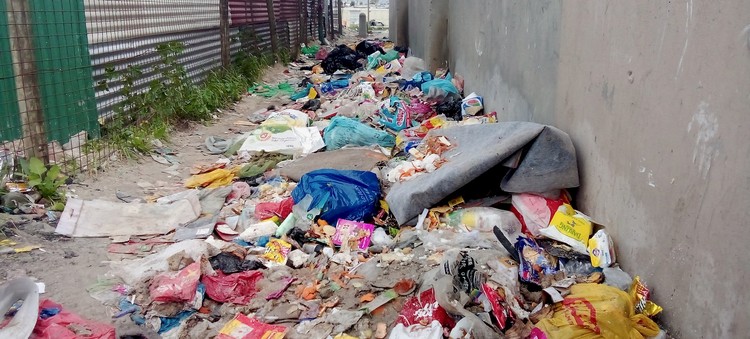Rubbish in Delft overwhelms City of Cape Town response
City says it spends R300-million a year cleaning up illegal dumps but can’t make headway without community support
Rubbish from illegal dumping along a pathway in Delft, Cape Town. Photos: Chris Gilili
Stinking rubbish is piled up on the streets, on any open ground, near churches, schools and public parks, and at a temporary relocation site in Delft South on the Cape Flats. Residents say they have been living in these filthy conditions for the past decade.
“It’s getting worse every day,” says Lionel Pienaar, a green grocer with a stall near a park. “This place was a park back in the day, but over the years it has turned into an illegal dumping zone.”
“The only way we fight it is by burning the mounting filth. But this doesn’t help much at all. People often dump here during the night.”
He says he has trouble with rats raiding his vegetables and fruit. In summer, he struggles with flies. “I am really suffering,” he says.
Pienaar says the City is not doing nearly enough.
“At least a board, saying no dumping and saying that the City will fine people who are seen dumping could maybe work. There is no effort at all. We have asked several times for even a big bin.”
Resident Lelona Gwetyana also complains of rats emerging from the mounds of garbage next to her home. “We have made many appeals to community members to stop this, but it is getting worse every day, so we have accepted it. We ask the City to do more. We cannot continue living like pigs,” she said.
A huge illegal dumping area exists near this temporary relocation site in Delft South.
Spokesperson for the City Racine Edwardes said illegal dumping costs the City over R300-million a year. “Even drastic increases in this budget will not keep Cape Town clean given current volumes of waste being dumped,” she said.
“The City is clearing illegal dumping in Delft on an ongoing basis. Unfortunately however, dumping is largely accepted in this community, so dumping hotspots are never clean for long,” said Edwardes.
“During February 2023 … a total of 149 fines were issued for littering and illegal dumping, with a total value of R287,000, across various areas including Delft,” she said.
The City has planned an engagement session with residents at the Delft Civic Centre on 25 October 2023.
Lionel Pienaar says rats and flies plague his store because illegal dumping is not being addressed adequately.
Support independent journalism
Donate using Payfast

Don't miss out on the latest news
We respect your privacy, and promise we won't spam you.
Next: Motsoaledi to apply for leave to appeal ZEP rulings
Previous: Most recipients unpaid after millions stolen from Guardian’s Fund
Letters
Dear Editor
Landfills aren't the solution. Globally, cities, governments and citizens should hold manufacturers responsible for the trash they produce.
So much plastic food packaging is not recyclable, and this leaves a huge problem that society must deal with. Food manufacturers need to redesign packaging to make it compostable, recyclable or, better still, reusable. It's time to move to a circular economy because pollution affects poorer communities the most and destroys ecosystems all around the world.
Perhaps a trash tax should be implemented to incentivise the change. You will not find a glass Coca-Cola bottle in the trash because people can return it for some money. Therefore packaging should be valuable and not be allowed to be produced so cheaply because this is the very high cost we pay for trash. Putting it in a big hole doesn't make the problem go away.
© 2023 GroundUp. This article is licensed under a Creative Commons Attribution-NoDerivatives 4.0 International License.
You may republish this article, so long as you credit the authors and GroundUp, and do not change the text. Please include a link back to the original article.
We put an invisible pixel in the article so that we can count traffic to republishers. All analytics tools are solely on our servers. We do not give our logs to any third party. Logs are deleted after two weeks. We do not use any IP address identifying information except to count regional traffic. We are solely interested in counting hits, not tracking users. If you republish, please do not delete the invisible pixel.



